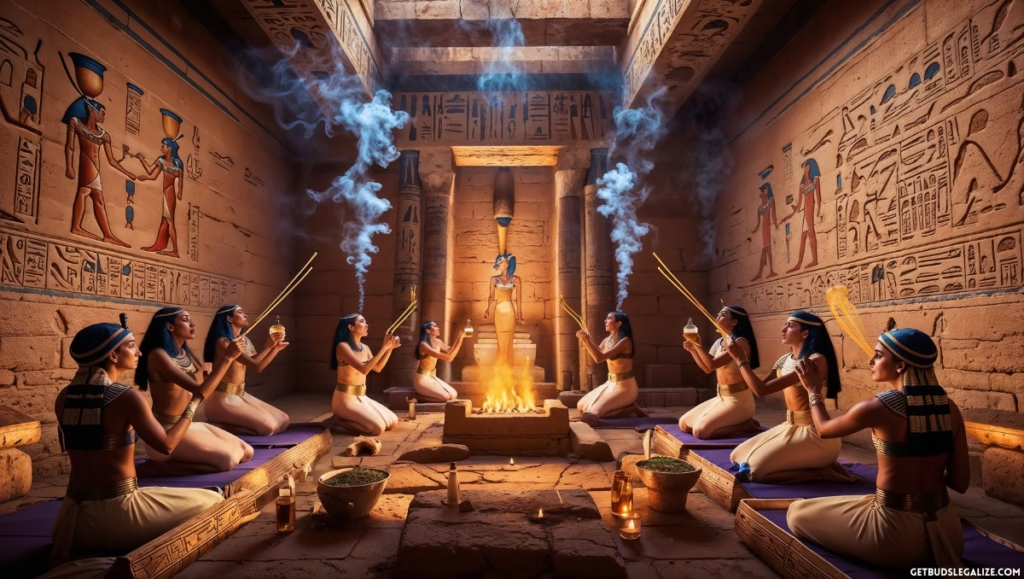The History of Cannabis in Ancient Egypt: Medicinal and Spiritual Practices During the Time of the Pharaohs
Cannabis holds a captivating place in the chronicles of ancient history. In Egypt, one of the world’s earliest and most advanced civilizations, this versatile plant was cherished not only for its medicinal benefits but also for its profound spiritual significance.
For the ancient Egyptians, cannabis represented health, healing, and a divine connection, seamlessly intertwining with their medical practices and sacred rituals. By exploring its multifaceted applications, we gain a deeper understanding of a society that valued cannabis as both a physical remedy and a conduit to the divine.
The Roots of Cannabis in Ancient Egypt
Cannabis likely arrived in Egypt as early as 4000 BCE through trade with Central Asia and the Mediterranean. The bustling trade routes of the ancient world brought more than just goods; they carried ideas, practices, and plants that transformed societies.
Initially valued for its durable fibers, which were used to make ropes, nets, and textiles, cannabis quickly gained recognition for its psychoactive and therapeutic properties. The Egyptians, always quick to harness nature’s gifts, incorporated cannabis into various aspects of their daily and spiritual lives.
Integration into Egyptian Life
Unlike many cultures that restricted cannabis use to a single domain, Egypt embraced the plant for its multifaceted benefits. It became a cornerstone of their holistic worldview, where health, spirituality, and the natural world were deeply interconnected.
Cannabis in Egyptian Medicine: Healing Through Nature

The ancient Egyptians were pioneers of medical science, developing a sophisticated system of remedies derived from plants, minerals, and animal products. Cannabis was a key element in their arsenal, used to treat a wide range of ailments.
The Ebers Papyrus: A Testament to Medical Innovation
The Ebers Papyrus (circa 1550 BCE), one of the oldest surviving medical documents, provides valuable insights into the medicinal uses of cannabis. This ancient text describes remedies for pain, inflammation, digestive issues, and more, highlighting the Egyptians’ advanced understanding of the plant’s potential.
Key Medicinal Uses of Cannabis
- Pain Relief: Cannabis was a go-to remedy for alleviating pain from injuries, surgeries, or chronic conditions. Often applied as a poultice or infused into ointments, it provided relief in an era with limited medical resources.
- Anti-inflammatory Properties: The Egyptians used cannabis to soothe inflammation, particularly for conditions like arthritis and joint pain. Its application as an oil or compress demonstrated their sophisticated approach to managing chronic ailments.
- Digestive Health: Cannabis was employed to treat digestive issues such as nausea and constipation. Its calming effects on the stomach made it a reliable remedy for gastrointestinal discomfort, a practice that resonates with modern medicinal cannabis use.
- Potential for Glaucoma Treatment: While not definitively proven, some scholars suggest that the Egyptians might have used cannabis to relieve eye pressure caused by conditions like glaucoma. This theory aligns with their advanced knowledge of anatomy and plant-based medicine.
The Role of Cannabis in Egyptian Spirituality and Religion

A Sacred Substance
In ancient Egyptian culture, spirituality was deeply embedded in daily life. Cannabis held a revered place in rituals, seen as a medium to connect the physical and divine realms.
Honoring Hathor: Goddess of Love and Music
Cannabis was integral to rituals dedicated to Hathor, the goddess of love, fertility, and joy. Worshippers used cannabis-infused oils to enter trance-like states, allowing them to transcend earthly concerns and commune with the goddess.
Imagine the vibrant atmosphere of an ancient temple—incense wafting through the air, rhythmic chants filling the space, and participants experiencing spiritual elevation through the psychoactive effects of cannabis.
Cannabis and Osiris: The Cycle of Life and Death
The spiritual significance of cannabis extended into the realm of the afterlife. Associated with Osiris, the god of rebirth, cannabis symbolized renewal and was often included in burial practices.
- Funerary Rituals: Oils and incense infused with cannabis were used to prepare the deceased for their journey to the afterlife, ensuring safe passage and spiritual enlightenment.
- Archaeological Evidence: Traces of cannabis have been found in tombs, often alongside other sacred substances like myrrh and frankincense, highlighting its importance in death rituals.
Archaeological Discoveries: Evidence of Cannabis Use in Ancient Egypt
Modern archaeology has unearthed compelling evidence of cannabis’s role in ancient Egypt.
In 1992, traces of cannabis were discovered in the tomb of a high-ranking Egyptian official. This finding confirmed the plant’s ceremonial and medicinal significance. The presence of hashish—a concentrated form of cannabis—suggests that Egyptians harnessed its potent psychoactive properties for both healing and spiritual practices.
Such discoveries provide a tangible link to the past, affirming the Egyptians’ innovative use of cannabis in ways that resonate with modern practices.

Cannabis in Egypt Compared to Other Civilizations
While ancient Egypt was a forerunner in the use of cannabis, other civilizations also recognized its value:
- India: Cannabis was central to religious ceremonies dedicated to Shiva, symbolizing transformation and divine connection.
- China: Ancient Chinese medicine utilized cannabis to treat ailments ranging from rheumatism to digestive issues.
- Scythians: This nomadic people from Central Asia used cannabis in funerary rituals, burning it to communicate with the dead.
What set Egypt apart was its holistic integration of cannabis into both physical healing and spiritual practices, creating a unique dual-purpose role for the plant.
The Decline of Cannabis Use in Egypt
As Egypt fell under the influence of foreign powers like the Greeks and Romans, the prominence of cannabis began to wane. The introduction of new medical and religious practices marginalized the traditional uses of cannabis.
However, the legacy of ancient Egyptian cannabis practices endures. The plant’s medicinal and spiritual significance has transcended time, inspiring modern applications that echo its historical roots.

Modern Parallels: The Renaissance of Cannabis
Today, cannabis is undergoing a global revival. Modern science validates many of the benefits known to the ancient Egyptians, such as:
- Pain Management: Cannabis is widely used to treat chronic pain and inflammation.
- Mental Health: Its calming effects are utilized in managing anxiety and stress.
- Spiritual Practices: Cannabis is increasingly embraced in mindfulness and meditation, mirroring its ancient role as a spiritual tool.
This resurgence highlights the timeless relevance of cannabis and the enduring wisdom of ancient Egyptian practices.
Conclusion: The Legacy of Cannabis in Ancient Egypt
Cannabis in ancient Egypt was more than a plant—it was a symbol of healing, spirituality, and the eternal cycle of life and death. The Egyptians’ innovative use of cannabis serves as a testament to their profound understanding of nature’s gifts.
By revisiting their wisdom, we not only honor the past but also gain insights into how cannabis can continue to enrich human life. From its medicinal properties to its ability to foster spiritual connection, the legacy of cannabis in ancient Egypt transcends millennia, offering inspiration for both science and spirituality today.
Frequently Asked Questions (FAQs) about Marijuana in Ancient Egypt
In ancient Egyptian medicine, cannabis was used for its therapeutic properties. It was commonly used as a remedy for pain relief, inflammation, digestive issues, and eye conditions such as glaucoma. Cannabis was valued for its ability to treat both physical ailments and as a soothing agent for general discomfort.
Yes, cannabis was an important part of Egyptian religious practices. It was believed to have psychoactive effects that could facilitate communication with the gods. The plant was used in sacred oils, incense, and rituals, particularly those associated with deities like Hathor, the goddess of fertility and love, and Osiris, the god of the afterlife. Cannabis was likely used to achieve heightened spiritual experiences and divine connection.
Yes, cannabis was used in Egyptian funerary practices. Archaeological evidence suggests that cannabis was placed in tombs, possibly to aid the deceased on their journey to the afterlife. The plant’s psychoactive and symbolic properties were thought to help ensure a safe passage to the next life.
Marijuana in ancient Egypt was likely consumed in various forms, including as oils, ointments, and incense. These forms would have been applied topically, burned in rituals, or possibly even ingested in small amounts. Some scholars suggest that cannabis was used in a more concentrated form, such as hashish, in certain religious ceremonies.
While many ancient civilizations used cannabis for medicinal and spiritual purposes, Egypt’s use was unique in its integration of both healing and religious rituals. Similar to other cultures like the Scythians and Indians, cannabis in Egypt was believed to facilitate spiritual communication, but it was also widely applied for therapeutic healing, marking a comprehensive role in daily life.
Cannabis was considered sacred in Ancient Egypt due to its psychoactive properties, which were believed to enhance spiritual experiences. It was particularly linked to rituals of fertility, rebirth, and the afterlife. The psychoactive effects of cannabis helped priests and worshippers achieve altered states of consciousness, making them more receptive to divine messages during religious ceremonies.
Yes, cannabis had significant symbolic value in ancient Egypt. It was associated with the concepts of rebirth, immortality, and protection. As part of religious rituals, it may have been seen as a means to aid the transition to the afterlife and ensure a safe journey for the deceased. The plant was also tied to the fertility and love aspects of deities like Hathor.
Archaeological evidence supporting cannabis use in Ancient Egypt includes the discovery of cannabis remnants in Egyptian tombs. In 1992, traces of cannabis were found in the tomb of a high-ranking Egyptian official, suggesting that the plant was included in funerary practices. Additionally, the Ebers Papyrus, an ancient Egyptian medical text, references the medicinal uses of cannabis.
The use of cannabis in Ancient Egypt likely influenced neighboring civilizations, including the Greeks and Romans, who adopted cannabis in their own medicinal and spiritual practices. The plant’s widespread use in Egypt, particularly in healing and religious rituals, contributed to its significance in other ancient cultures across the Mediterranean and beyond.
Today, cannabis is illegal in Egypt, and its use is strictly regulated. However, its historical significance still attracts interest from scholars and enthusiasts. In recent years, there has been growing global interest in the medicinal properties of cannabis, with some modern-day Egyptians exploring the plant’s therapeutic benefits through research and alternative healing practices.
The decline in cannabis use in Ancient Egypt is largely attributed to the influence of foreign rulers, such as the Greeks and Romans. As their medical practices took root in Egypt, they introduced new methods of healing, pushing cannabis to the periphery. Over time, the plant’s spiritual and medicinal importance diminished, but its legacy persisted in historical texts and archaeological sites.
Yes, cannabis is illegal in Egypt. The country enforces strict drug laws, and possession or use of cannabis can result in severe penalties. It’s important to understand Egypt drug laws before visiting or traveling there.
In Egypt, the legal substances are limited to items such as alcohol (for non-Muslim tourists) and prescription medications, provided they are prescribed by a licensed physician. Cannabis and other recreational drugs are illegal.
Bringing edibles containing cannabis into Egypt is strictly prohibited. Any form of cannabis, including edibles, is illegal under Egypt’s drug laws, and violations can lead to severe penalties, including imprisonment.
In early civilizations, cannabis was valued for both its medicinal and spiritual properties across multiple cultures.
In ancient China, cannabis was utilized for its healing benefits, with historical texts indicating its use in treating conditions like pain, inflammation, and digestive issues. The Chinese also recognized its role in promoting overall wellness and its calming effects.
Similarly, ancient India incorporated cannabis into Ayurvedic medicine, where it was used for a variety of ailments, including anxiety, pain relief, and as a digestive aid. Cannabis was also important in spiritual practices, often consumed during religious rituals to facilitate meditation and connect with the divine.
In ancient Greece, medical cannabis was prescribed by physicians like Hippocrates, who recognized its effectiveness in alleviating pain and treating conditions such as gout and inflammation. Greek physicians often recommended cannabis as a remedy for various health issues, further solidifying its importance in early medical treatments.
The use of medicinal cannabis in these ancient civilizations underscores its longstanding role as both a therapeutic and ceremonial plant, with many of its uses still being explored in modern-day medicine.
ILGM Fertilizer

- From seedling to harvest, give your plants everything they need.
- Enough for feeding at least 5 plants.
- Discounted Package Deal
- Works well in soil, hydroponics, and other growing mediums.
- The best way to treat your plants
ILGM Plant Protector

- Protect your cannabis from diseases and harmful pests.
- Contains three 20 ml bottles.
- Enough supplies to protect 20 plants.
- It can be used in soil, hydroponic, and all other growing mediums.





















